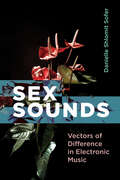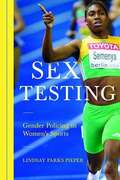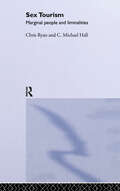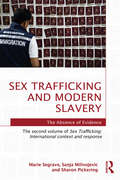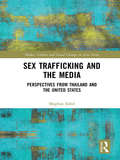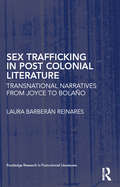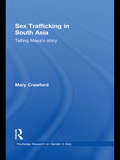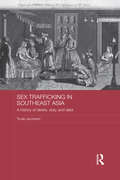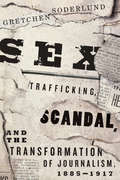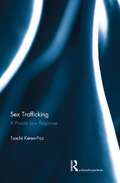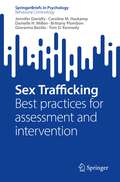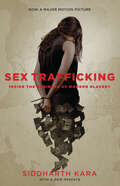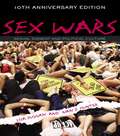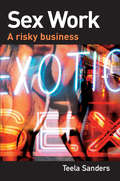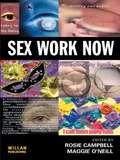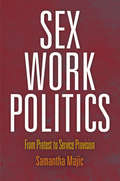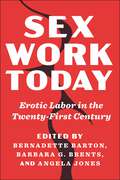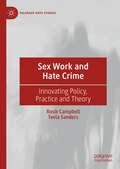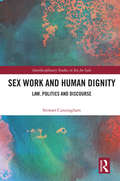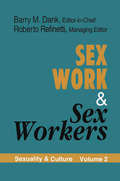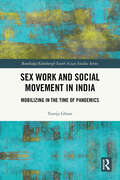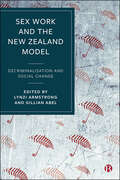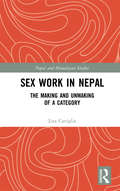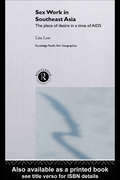- Table View
- List View
Sex Sounds: Vectors of Difference in Electronic Music
by Danielle Shlomit SoferAn investigation of sexual themes in electronic music since the 1950s, with detailed case studies of &“electrosexual music&” by a wide range of creators. In Sex Sounds, Danielle Shlomit Sofer investigates the repeated focus on sexual themes in electronic music since the 1950s. Debunking electronic music&’s origin myth—that it emerged in France and Germany, invented by Pierre Schaeffer and Karlheinz Stockhausen, respectively—Sofer defines electronic music more inclusively to mean any music with an electronic component, drawing connections between academic institutions, radio studios, experimental music practice, hip-hop production, and histories of independent and commercial popular music. Through a broad array of detailed case studies—examining music that ranges from Schaeffer&’s musique concrète to a video workshop by Annie Sprinkle—Sofer offers a groundbreaking look at the social and cultural impact sex has had on audible creative practices. Sofer argues that &“electrosexual music&” has two central characteristics: the feminized voice and the &“climax mechanism.&” Sofer traces the historical fascination with electrified sex sounds, showing that works representing women&’s presumed sexual experience operate according to masculinist heterosexual tropes, and presenting examples that typify the electroacoustic sexual canon. Noting electronic music history&’s exclusion of works created by women, people of color, women of color, and, in particular Black artists, Sofer then analyzes musical examples that depart from and disrupt the electroacoustic norms, showing how even those that resist the norms sometimes reinforce them. These examples are drawn from categories of music that developed in parallel with conventional electroacoustic music, separated—segregated—from it. Sofer demonstrates that electrosexual music is far more representative than the typically presented electroacoustic canon.
Sex Testing: Gender Policing in Women's Sports (Sport and Society)
by Lindsay PieperIn 1968, the International Olympic Committee (IOC) implemented sex testing for female athletes at that year's Games. When it became clear that testing regimes failed to delineate a sex divide, the IOC began to test for gender --a shift that allowed the organization to control the very idea of womanhood. Lindsay Parks Pieper explores sex testing in sport from the 1930s to the early 2000s. Focusing on assumptions and goals as well as means, Pieper examines how the IOC in particular insisted on a misguided binary notion of gender that privileged Western norms. Testing evolved into a tool to identify--and eliminate--athletes the IOC deemed too strong, too fast, or too successful. Pieper shows how this system punished gifted women while hindering the development of women's athletics for decades. She also reveals how the flawed notions behind testing--ideas often sexist, racist, or ridiculous--degraded the very idea of female athleticism.
Sex Tourism: Marginal People and Liminalities
by Chris Ryan Michael C. HallSex Tourism examines the issues which emerge from sex worker-client interactions and from tourists visiting 'sex destinations'. It is a comprehensive summary of past research by academics and original primary and secondary research by the authors and has examples from Asia, Australasia and the USA.The authors have generated new models to show different dimensions of sex tourism, which normalise at least some components of the sex industry, and represent a new way of looking at sex tourism by challenging the preconceived perceptions that some people have of sex tourism or confirm the impression of others. Sex Tourism looks at issues of importance to those working in tourism, women's studies, gender studies and social change.
Sex Trafficking and Modern Slavery: The Absence of Evidence
by Sharon Pickering Marie Segrave Sanja MilivojevicThe second volume of Sex Trafficking: International context and response Human trafficking and modern slavery have captured the imagination and attention of the international community. This book builds on the authors’ first volume, Sex Trafficking: International context and response. Much has changed since the first volume was published, not least the shift away from sex trafficking to modern slavery as the dominant focus in policy and advocacy. Yet, as the authors argue, little has changed with regards to how nations respond. This volume re-examines the international counter-trafficking scholarship and policy response, to offer an analysis based on original and new data. This book lays the ground for specific forms of research and inquiry that are necessary to better understand and respond to the range of exploitative practices and conditions that give rise to human trafficking. This book offers a detailed analysis of the dominant response to human trafficking, which is framed by the criminal justice process. Examining the identification of victims, the investigation of cases, victim support, prosecutorial decisions and repatriation practices, the authors draw upon original research from Australia, Serbia and Thailand: three diverse nations that, like nations across the globe, have invested heavily in criminalisation as the dominant response to counter trafficking. They argue that exploitation sits at the nexus of global migration patterns and emphasise the importance of speaking to those directly affected by counter-trafficking policies and those directly involved in their implementation in order to produce empirical data to inform how we make sense of the numbers that are produced, the outcome of the policies and how we ought to determine success in this context. An empirical, criminologically informed opportunity to reconsider the dominant ways of understanding and strategies of responding to human trafficking, this multi-disciplinary book will be of interest to those engaged in criminology, sociology, law, political science, public policy and gender studies.
Sex Trafficking and the Media: Perspectives from Thailand and the United States (Media, Culture and Social Change in Asia)
by Meghan SobelThis book explores how sex trafficking has been reported in the media. The book is set in the context of reportage of this human rights abuse in two varying political landscapes – the United States being a developed democracy and Thailand experiencing continued political turmoil including a May 2014 coup d’état and an accompanying crackdown on free expression by the ruling military junta. In doing so, the book shows how there are great similarities between the two countries in the way the issue is misrepresented. Drawing on content analysis of news coverage in the United States and Thailand as well as interviews with journalists, anti-trafficking advocates, survivors of sex trafficking and consensual sex workers, this book illuminates reasons why coverage is framed in the way(s) that it is, how anti-trafficking advocates can act as media advocates to push coverage in new directions, and how journalistic functions are similar and different in the two countries.
Sex Trafficking in Postcolonial Literature: Transnational Narratives from Joyce to Bolaño (Routledge Research in Postcolonial Literatures)
by Laura Barberán ReinaresAt present, the bulk of the existing research on sex trafficking originates in the social sciences. Sex Trafficking in Postcolonial Literature adds an original perspective on this issue by examining representations of sex trafficking in postcolonial literature. This book is a sustained interdisciplinary study bridging postcolonial literature, in English and Spanish, and sex trafficking, as analyzed through literary theory, anthropology, sociology, history, trauma theory, journalism, and globalization studies. It encompasses postcolonial theory and literature’s aesthetic analysis of sex trafficking together with research from social sciences, psychology, anthropology, and economics with the intention of offering a comprehensive analysis of the topic beyond the type of Orientalist discourse so prevalent in the media. This is an important and innovative resource for scholars in literature, postcolonial studies, gender studies, human rights and global justice.
Sex Trafficking in South Asia: Telling Maya's Story (Routledge Research on Gender in Asia Series)
by Mary CrawfordThis book is a critical feminist analysis of sex trafficking. Arguing that trafficking in girls and women is a product of the social construction of gender and other dimensions of power and status within a particular culture and at a particular historical moment, this book offers the necessary locally grounded analysis. Focusing on the case of Nepal, from where 5,000 to 7,000 thousands of Nepali girls and women are trafficked each year primarily to India, Mary Crawford assesses how the social construction of trafficking - the concept and its representation in discourse - are influenced by the dynamics of gender, caste, and the development establishment. The defining figure is an innocent, naïve young girl being lured or duped into leaving the safety of her village. The trafficking victim is portrayed as "backward"; however, she is "backward" in specific ways that resonate with Nepal’s struggle to resist and yet encompass Western influence. This view may lead to paradoxical effects in which efforts to protect girls and women instead restrict their human rights. Rather than seeing women as universalized victims, Crawford assesses how the social construction of trafficking in a particular society affects girls and women who live in that society. In this book, the author’s voice as a woman, a feminist, and a social scientist immersed in a "foreign" way of life, illuminates aspects of this process and highlights the subjectivity of urban women. It makes the connection between Nepali subjectivities and a problem of international significance, the trafficking of girls and women. The book provides a model for other locally grounded accounts of sex trafficking to counter the universalizing rhetoric of the mass media and some anti-trafficking activists, filling a niche in South Asian Studies and Women’s Studies.
Sex Trafficking in Southeast Asia: A History of Desire, Duty, and Debt (ASAA Women in Asia Series)
by Trude JacobsenThis book brings an important new perspective to the study of sex trafficking by considering the different types of social contracts which existed in the past that had sexual labour or activity as an inherent component. It outlines the nature of these social institutions – marriage, temporary marriage, debt bondage, and slavery – which were recognized in local law, carried no stigma, and endured for long periods. It discusses how labour pledged in return for a loan of cash or as a result of a punishment dictated by the state often included sexual labour, and how this could take the form of servicing the master of the house, his guests, or foreign travellers, who paid the debt-holder for the privilege, and how even wives of different ranks, temporary or permanent, and children, were pledged as sureties for loans. The book, which covers the modern states of Myanmar, Thailand, Laos, Cambodia, and Vietnam, argues that cultural norms are not static, that sexual contracts are more complicated than simply ‘marriage’ or ‘prostitution’, and that as trafficking for sexual purposes increases, those engaging in humanitarian intervention should improve their knowledge of the historical underpinnings of cultural understandings of familial and contractual obligations.
Sex Trafficking, Scandal, and the Transformation of Journalism, 1885-1917
by Gretchen SoderlundDuring the first half of the nineteenth century, the penny presses of the industrial East treated brothels as a mundane, if annoying, aspect of city life. But later in the century, reformers and mainstream papers began to push back against this representation through highly public campaigns against "white slavery. " These newspaper crusades mixed a potent cocktail of lurid sexual detail and sensationalist scandal aimed equally at promoting anti-vice measures, arousing popular demand for progressive reform, and increasing newspaper circulation. In Sex Trafficking, Scandal, and the Transformation of Journalism, Gretchen Soderlund offers a new way to understand sensationalism in both newspapers and reform movements. By tracing the history of high-profile print exposés on sex trafficking by journalists like William T. Stead and George Kibbe Turner, Soderlund demonstrates how controversies over gender, race, and sexuality were central to the shift from sensationalism to objectivity--and crucial to the development of journalism in the early twentieth century.
Sex Trafficking: A Private Law Response
by Tsachi Keren-PazSex Trafficking: A Private Law Response examines existing and potential causes of action against sex traffickers, clients and the state and argues for fair and effective private law remedies. Combining a theoretical inquiry about the borders of liability in torts and restitution with a political commitment to protecting the interests of victims of sex trafficking, this book offers a comparative doctrinal and socio-legal analysis of private law remedies, their justification, and their effectiveness. Tsachi Keren-Paz innovatively and convincingly makes the argument that all those directly involved in breaching the rights of victims of sex trafficking should compensate them for their losses, and make restitution of the profits made at their expense. Sex Trafficking: A Private Law Response will be invaluable to both academics and practitioners concerned with prostitution, modern slavery and trafficking, and those interested in private law theory and practice.
Sex Trafficking: Best practices for assessment and intervention (SpringerBriefs in Psychology)
by Jennifer Davidtz Tom D. Kennedy Danielle H. Millen Caroline M. Haskamp Brittany Plombon Giovanna BasilioThis Brief proposes best practices for assessment and intervention with sex trafficking survivors, rooted in the existing theory and practice literatures. Based in current research and clinical practice, these recommendations are embedded in the context of cultural sensitivity. This volume provides a relevant, practical, and informative outline of sex trafficking, associated legal aspects, and best practices for mental health clinicians to aid in successful treatment of sex trafficking survivors.
Sex Trafficking: Inside the Business of Modern Slavery
by Siddharth KaraSince the publication of Sex Trafficking in 2007, Siddharth Kara has continued to travel across countries and continents, documenting the local factors and economic forces that support sexual slavery worldwide. His riveting encounters with victims and traffickers informed his screenplay for Trafficked (2016), now a major motion picture. The film features familiar figures from Sex Trafficking and the shocking conditions of their exploitation. It also includes cases Kara has uncovered since his book debuted.This new paperback edition of Sex Trafficking includes a preface by Kara in which he discusses his findings and updates the statistics relating to his business and economic analysis of contemporary slavery. After fifteen years, Kara has recorded nearly 900 cases of sex trafficking in forty-one countries and has helped advise on numerous legal, tactical, and policy efforts for abolishing modern-day slavery across the globe. Sex Trafficking continues to lead as a resource for those hoping to expose this hidden evil and eradicate its practice once and for all.
Sex Variant Women In Literature
by Jeannette Howard FosterFirst published in 1956. Essential history of lesbian literature. "Must" reading for the serious collector and researcher.
Sex Wars: Sexual Dissent and Political Culture (10th Anniversary Edition)
by Lisa Duggan Nan D. HunterThis book is a collection of essays written during the 1980s and 1990s, generated as parts of other, larger activist efforts going on at the time. Read together, the essays trace the progress of the conversations between different activist groups, and between the authors of the pieces, Lisa Duggan and Nan Hunter, creating a bridge between feminists, gay activists, those in politics, and those in the law. Since the 1995 publication of Sex Wars, the political landscape has altered significantly. Yet the issues (and essays) are still relevant today. The anniversary edition contains a new chapter dealing with the changes in the law since the book's publication (Lawrence v. Texas, for example).
Sex Work
by Teela SandersThis is a richly detailed account of the way the sex industry works, and one of the few empirical studies that investigates the off street industry in Britain. The book seeks to advance a greater knowledge of the social organisation of the sex industry by uncovering the day-to-day activities of women involved in the indoor markets. What types of occupational risks do women experience in work of this kind? How do these hazards affect their personal lives? A key concern throughout the book is to assess whether women are passive victims of the circumstances of prostitution or whether they understand and calculate their responses to danger. Drawing upon both sociological and criminological theories, and on detailed research in the city of Birmingham, the author addresses these questions by estimating the rationality of those responses and by providing a measure of how women make sense of different risks. Sex Work: a risky business describes how women create complex psychological and emotional techniques to maintain their sanity while selling sex, and goes on to argue that the indoor sex markets in Britain have a distinct 'occupational culture' with a set of social norms, code of conduct and moral hierarchies that make it a high regulated workplace despite its illicit and sometimes illegal nature.
Sex Work Now
by Maggie O'Neill Rosie CampbellSex Work Now provides an authoritative overview of female sex work and policy in the UK, and addresses a number of key contemporary issues and debates. These include sex worker unionization, migrant sex work and trafficking, communities and sex work, male clients of sex workers, the policing of prostitution, zoning of street sex work, young people and sexual exploitation, drug use and sex work, exiting, violence and sex work. Throughout the book is shaped by the lives and experiences of sex workers themselves drawing on applied, policy or participatory action research. This book approaches the subject from an interdisciplinary perspective, cutting across conventional boundaries of sociology, criminology, politics and social policy. Contributors to the book include academics, researchers, practitioners and activists who are among the leading commentators on prostitution in the UK. provides overview of sex work in UK considers impact of recent legislation and policy, especially Sex Offences Act 2003 focus on lives and experiences of sex workers themselves
Sex Work Politics
by Samantha MajicIn San Francisco, the St. James Infirmary (SJI) and the California Prostitutes Education Project (CAL-PEP) provide free, nonjudgmental medical care, counseling, and other health and social services by and for sex workers--a radical political commitment at odds with government policies that criminalize prostitution. To maintain and expand these much-needed services and to qualify for funding from state, federal, and local authorities, such organizations must comply with federal and state regulations for nonprofits. In Sex Work Politics, Samantha Majic investigates the way nonprofit organizations negotiate their governmental obligations while maintaining their commitment to outreach and advocacy for sex workers' rights as well as broader sociopolitical change.Drawing on multimethod qualitative research, Majic outlines the strategies that CAL-PEP and SJI employ to balance the conflicting demands of service and advocacy, which include treating sex work as labor with legitimate occupational health and safety concerns, empowering their clients with civic skills to advance their political commitments outside the nonprofit organization, and conducting and publishing research and analysis to inform the public and policymakers of their constituents' needs. Challenging the assumption that activists must "sell out" and abandon radical politics to manage formal organizations, Majic comes to the surprising conclusion that it is indeed possible to maintain effective advocacy and key social movement values, beliefs, and practices, even while partnering with government agencies. Sex Work Politics significantly contributes to studies of transformational politics with its nuanced portrait of nonprofits as centers capable of sustaining political and social change.
Sex Work Today: Erotic Labor in the Twenty-First Century
by Bernadette Barton, Barbara G. Brents, and Angela JonesA cutting-edge volume on current trends in sex work, from sugar relationships and cyber brothels to financial domination, sex worker activism, and feminist pornSex is for sale in more ways than ever. It can be bought and sold online, in sex clubs, on the street, and around the world. As with many industries, discrimination, exploitation, and inequality persist in sex work. Yet it also offers autonomy, job satisfaction, and even pleasurable experiences for those involved. Sex Work Today explores these contradictions, offering an intimate look at the benefits and challenges of sex work across geographic contexts.Featuring thirty-one original essays by sex workers, advocates, researchers, and activists, Sex Work Today is the first compilation of research on new forms of digital sex such as camming, sugar dating, and AI sex dolls. Providing a lens to understand contemporary labor dynamics and the nature of sex work itself, this collection captures formerly ignored aspects of the sex industry including: fatphobia and disability; transmasculine and nonbinary sex workers; racialized emotional labor in the digital sex industry; high job satisfaction among professional dominatrixes; and sex worker scholars.With federal policies ostensibly aimed at combating sex trafficking–affecting all sex workers–understanding this industry is more vital than ever. Decentering Western, white, cisgender voices, Sex Work Today underscores the global repercussions of these misaligned policies, which make sex work more challenging and less safe, and provides valuable insights for those seeking to shape policies, challenge prejudices, and foster a safer and more equitable world for all.
Sex Work and Hate Crime: Innovating Policy, Practice and Theory (Palgrave Hate Studies)
by Teela Sanders Rosie CampbellThis book brings together literature, empirical research findings from two projects, and policy analysis to examine how some forces in England have adopted the approach of treating crimes against sex workers as hate crimes. This book identifies some of the benefits of the hate crime approach to crimes against sex workers, both operationally and for some of the victims of crime. The authors argue that the hate crime approach should not be seen as an alternative to decriminalisation of sex work but can provide a pathway to achieving more sensitive but robust policing of crimes against sex workers and support in accessing justice through the criminal justice system. They also examine the broader context of hate crime policy and scholarship as they debate the relevance, problems and merits of the sex work hate crime model. The book provides another dimension to current theoretical and policy debates about widening definitions and law around hate crime to include other groups beyond existing protected characteristics.
Sex Work and Human Dignity: Law, Politics and Discourse (Interdisciplinary Studies in Sex for Sale)
by Stewart CunninghamThe notion of human dignity is frequently, yet enigmatically, invoked in legal and political debates on sex work, where many people use it without much elaboration on exactly what they mean by it. Sex Work and Human Dignity: Law, Politics and Discourse sheds light on this enigma, by exploring how dignity-based discourses are used by those who write and talk about prostitution and also what role these discourses may play in shaping wider cultural understandings of sex work and sex workers. The book draws on political discourse theory and is international in its scope, with analysis of legal cases, textual sources, and empirical data gathered through interviews with activists from several different countries in the Global North and South. The book traces how the concept of dignity is used in a range of legal and political discourses on sex work and ultimately asks to what extent dignity-based discourses help to advance, or hinder, sex workers’ social inclusion. This book will appeal to students and researchers interested in sex work and feminism, as well as those who study human dignity. Its interdisciplinary nature means it will appeal to those working in a range of disciplines, including law, sociology, philosophy, and political theory.
Sex Work and Sex Workers (Sexuality And Culture Ser. #Vol. 2)
by Barry M. Dank Roberto RefinettiSexuality & Culture serves as a compelling forum for the analysis of ethical, cultural, psychological, social, and political issues related to sexual relationships and sexual behavior. These issues include, but are not limited to: sexual consent and sexual responsibility; sexual harassment and freedom of speech and association; sexual privacy; censorship and pornography; impact of film/literature on sexual relationships; and university and governmental regulation of intimate relationships.In this volume, theoretical essays, research reports, and book reviews examine the topics of prostitution, pornography, and other forms of commercialization of sexuality. Contributions include: "Twelve Step Feminism Makes Sex Workers Sick" by Kari Kerum; "Sex, Beach Boys and Female Tourists in the Caribbean" by Klaus de Albuquerque; "Reframing 'Eve' in the AIDS Era: The Pursuit of Legitimacy by New Zealand Sex Workers" by Bronwen Lichtenstein; "Long-Term Consumption of X-Rated Materials and Attitudes toward Women among Australian Consumers of X-Rated Videos" by Roberto Hugh Potter; "Invisible Man: A Queer Critique of Feminist Anti-Pornography Theory" by Jody Norton; and "Theorizing Prostitution: The Question of Agency" by Melanie Simmons. Also included are reviews of Live Sex Acts: Women Performing Erotic Labor by Wendy Chapkis; New Sexual Agendas edited by Lynne Segal. In addition, Daphne Patai reviews Real Live New Girl: Chronicles of a Sex-Positive Culture by Carol Queen; Nina Hartley reviews Three in Love; Jo Doezema reviews Trafficking in Women; Valerie Jenness reviews Feminist Accused of Sexual Harassment by Jane Gallop; and Warren Farrell reviews the film In the Company of Men. This volume will be of interest to sociologists, psychologists, legal analysts, and policymakers.
Sex Work and Social Movement in India: Mobilizing in the Time of Pandemics (Routledge/Edinburgh South Asian Studies Series)
by Toorjo GhoseThis book examines and theorizes about the emergence, growth, impact, collapse, and rejuvenation of a sex worker movement in India, exploring the manner in which the two pandemics – HIV and COVID-19 – bookended a feminist movement through more than a quarter of a century, shaping its trajectory over the course of that time.Focusing on the sex workers’ collective Durbar Mahila Samanwaya Committee (DMSC) in Kolkata, the book asks these questions: How did a sex workers’ collective rise from the margins of Indian society during the HIV pandemic, to become the vanguard of a global sex work movement, with half a million members, and partner collectives stretching across the world? What were the strategies deployed by the collective to engage with the health, social, and political landscapes surrounding it? Moreover, what were the factors that led to the splintering of a solidarity that had endured for a quarter of a century? Finally, what does the DMSC story tell us about social movements that rise from the extreme margins of society in postcolonial contexts? Drawing on empirical research, the author explores the conceptual and practice implications for the fields of social movement, feminist, public health, and postcolonial political scholarship. The book suggests that activist, public health, social work, and policy initiatives in poor women’s communities in postcolonial contexts need to be informed by the temporal, community, organizational, institutional, and affective markers that emerge in the research.The first book to examine the DMSC sex work movement in India as a significant feminist movement of our times, this book will be of interest to researchers from a wide range of disciplines, including South Asian Studies, Sociology, Social Work, Public Health, Gender and Sexuality Studies, and Political Science.
Sex Work and the New Zealand Model: Decriminalisation and Social Change
by Lynzi Armstrong and Gillian AbelMore than 15 years have passed since the law regarding sex workers in New Zealand has changed. As a model it has been endorsed as best practice by international organisations, leading scholars and sex worker-led organisations. Yet in some corners, speculation is ongoing regarding its impacts on the ground. Written by an international group of experts, this groundbreaking collection provides the much needed in-depth research into how decriminalisation is playing out in sex workers' lives and how different groups of sex workers are experiencing it, while uncovering the challenges and tensions that remain to be negotiated in this field. Using the evidence from New Zealand, it makes an invaluable contribution to the international debates regarding sex work laws and the global struggle to realise sex workers' rights.
Sex Work in Nepal: The Making and Unmaking of a Category (Nepal and Himalayan Studies)
by Lisa CavigliaThis book explores ‘sex work’ in Nepal as a social and analytical category. Narrating stories of those subsumed under such definition, it examines changes as well as continuities characterising socio-cultural norms and perceptions through an analysis of sexual consumption. It also highlights the ways in which the development sector, media, and local community discourses frame ‘sex work’ as a distinct category. How does the work of development aid projects affect the understanding of the sex worker category? How are visual and media images employed to mark spaces of perdition in the Nepalese urban setting and what forms of imagination do they trigger? How are intimate practices and relations transformed by imported notions of love, and how do standards of propriety related to such interactions shift? This book attempts to answer some of these questions. An in-depth and intimate ethnography, the book deconstructs the sex worker category against the backdrop of global influences within local urban surroundings and points to the contradictions therein. Furthermore, through thorough descriptions of the experiences, agency, decision-making processes, and lives of those labelled as sex workers, the book challenges concepts such as deviance and victimhood. It proposes a counternarrative by rethinking ideas of gender, objectification, marginality, symbolic violence, and discrimination. This book will greatly interest researchers and scholars in women and gender studies, sociology and social anthropology, South Asian studies and social sciences, as well as NGOs and those involved in the development sector.
Sex Work in Southeast Asia: The Place of Desire in a Time of AIDS (Routledge Pacific Rim Geographies)
by Lisa LawSoutheast Asian sex workers are stereotypically understood as passive victims of the political economy, and submissive to western men. The advent of HIV/AIDS only compounds this image. Sex Work in Southeast Asia is a cultural critique of HIV/AIDS prevention programmes targetting sex tourism industries in Southeast Asia.
